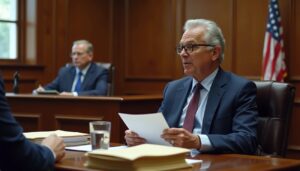In high-stakes trials, verdicts often rest not on emotions or opening arguments, but on numbers. Financial data (spreadsheets, tax records, asset valuations) frequently carries the weight of proof. Yet for jurors, most of whom lack any background in accounting or finance, these details can be overwhelming. That is where forensic accounting becomes indispensable.
A forensic accounting expert does more than calculate figures; they transform raw financial data into clear, persuasive courtroom narratives that jurors can understand and trust.
Whether it’s exposing hidden assets, demonstrating patterns of fraud, or calculating economic damages, forensic accounting shapes how evidence is perceived and, ultimately, how juries decide.
What Forensic Accounting Brings to High-Stakes Trials
In trials where millions of dollars, corporate reputations, or even personal freedom are on the line, forensic accounting serves as both a shield and a spotlight. It provides courts with structure when financial chaos threatens to obscure the truth. It is not simply about “finding fraud.” It’s about giving judges and juries a clear financial roadmap—one that demonstrates what happened, when, and why it matters under the law.
The Scope of Forensic Accounting in Litigation
A skilled forensic accountant functions like a financial detective. Instead of chasing criminals through alleys, they pursue transactions through spreadsheets, contracts, tax records, and bank accounts. Their scope is broad, and their impact depends on precision:
Tracing Transactions Across Multiple Layers.
Funds are rarely misappropriated in a straight line. Forensic accountants unravel webs of transfers designed to disguise intent, whether through shell companies, offshore accounts, or complex corporate structures.
Reconstructing Incomplete Records
In cases where documentation has been altered, deleted, or intentionally concealed, they piece together timelines from partial data. Something as simple as matching payroll logs with bank withdrawals can reveal patterns of misconduct.
Identifying Inconsistencies that Expose Misconduct
A forensic accounting expert will spot the “small tells” competitors might overlook, like revenue spikes that don’t align with inventory data, or expense classifications that conveniently lower taxable income.
- In contract disputes, forensic accountants calculate not only the damages claimed but also the real financial impact, accounting for lost opportunities, future earnings, and market conditions.
- In shareholder conflicts, they highlight misrepresentation in financial statements that may have artificially inflated stock value.
- And in criminal fraud cases, they follow the paper trail to show intent, turning abstract numbers into a story of deliberate deception.
Where competitors often stop at producing technical summaries, effective forensic accounting experts focus on how those findings will resonate in the courtroom. The difference is crucial: a spreadsheet may satisfy an attorney, but it will not sway a jury. Only when the data is translated into a narrative can it influence a verdict.
Why It’s Different From Traditional Accounting
Traditional accountants focus on compliance and reporting. By contrast, a forensic accounting expert witness must anticipate how evidence will be challenged in court. Their analysis must be both technically sound and courtroom-ready, capable of withstanding scrutiny from opposing counsel while still resonating with jurors.
Competitor Comparison
Large firms often produce technically accurate but inaccessible reports. The strongest experts move beyond reports—they translate numbers into stories jurors can follow, making them active participants in the evidence.
Why Juries Depend on Forensic Accounting Experts
Jurors are the ultimate decision-makers, yet they are often asked to make sense of financial evidence far outside their expertise. This is where a forensic expert witness becomes invaluable.
Simplifying Complexity Without Losing Accuracy
Jurors may see ledgers, bank statements, or valuation models as indecipherable. A skilled forensic expert translates them into timelines, charts, and analogies. For instance, instead of referencing “asset misallocation,” they might say: “Funds that should have gone to shareholders were diverted into a private account.”
Storytelling That Sticks With Jurors
The most persuasive testimony doesn’t bury jurors in numbers—it gives them a narrative. A forensic accounting expert illustrates patterns of behavior (like consistent underreporting of income) in ways jurors can connect with. Once jurors understand the story, they remember it when deliberating.
Where some firms overwhelm juries with jargon, Mr. Friedman is known for emphasizing clarity and neutrality. That reputation means jurors walk away trusting not just the math, but the messenger.
The Expert Witness Effect – Beyond the Numbers
Forensic accounting testimony isn’t just about presenting evidence—it’s about persuading through delivery. Jurors evaluate experts not only on what they say, but how they say it.
Credibility Under Pressure
Cross-examination often aims to rattle the expert. A confident, calm demeanor helps reinforce the impression that the testimony is objective. Jurors notice hesitation, defensiveness, or overly technical responses, and these cues shape their trust.
Juror Psychology in Play
- Clarity signals Jurors equate simple explanations with honesty.
- Composure signals Remaining steady under cross builds credibility.
- Neutrality signals Appearing unbiased assures jurors that the testimony is fact-based, not advocacy.
Where Competitors Struggle
Many competitor experts overemphasize technical accuracy and neglect delivery. But jurors are human: they respond more strongly to clarity and demeanor than spreadsheets. This is why the “expert witness effect” matters; testimony is as much about perception as precision.
Common Pitfalls That Undermine Jury Confidence
Forensic accounting can be decisive, but poorly delivered testimony risks sabotaging even the strongest evidence. When jurors lose trust in an expert witness, financial truth becomes noise rather than persuasion. Unfortunately, many forensic accounting experts fall into predictable traps that weaken their influence in court.
Overloading Jurors With Jargon
One of the fastest ways to lose a jury is to overwhelm them with technical language. Forensic accountants often default to the terminology of their profession: debits, accruals, valuation adjustments, and cost allocations. To an accountant, these words are everyday language. To a jury, they may as well be a foreign alphabet.
The mistake isn’t simply in using jargon; it’s in failing to translate. Jurors don’t need to understand accounting standards line by line; they need to grasp the meaning behind the numbers. For instance, saying “revenue recognition was misapplied under GAAP” will fall flat. Explaining it as “the company counted money before it was actually earned” lands with clarity.
When experts forget that their audience is twelve laypeople, not a room of CPAs, credibility vanishes. The best forensic accounting expert witnesses simplify without dumbing down, using analogies, visuals, and plain speech to make sure the jury follows every step.
Appearing as an Advocate Instead of an Analyst
Jurors expect experts to be neutral educators, not hired guns. The moment an expert looks like they are “arguing for one side,” their testimony loses weight. This pitfall is particularly damaging in states like Florida, where courts see a high volume of complex commercial disputes. Here, credibility is currency, and a forensic accounting Florida expert must project impartiality at all times.
Bias can reveal itself subtly through defensive answers under cross-examination, a dismissive tone toward opposing evidence, or testimony that feels rehearsed rather than objective. Jurors are quick to detect these cues. Once they decide an expert is an advocate, every number presented gets viewed through a lens of suspicion.
True forensic professionals let evidence carry the case. They explain findings in a way that would remain the same regardless of which side retained them. This impartial stance doesn’t just build juror trust; it strengthens the attorney’s case by showing the evidence is strong enough to stand on its own.
Weak Communication of Complex Models
Financial models are the backbone of forensic accounting, which includes damages calculations, lost profits analyses, and asset valuations. But if those models aren’t clearly explained, they become liabilities instead of strengths. Jurors who sense complexity without clarity often assume the expert is hiding something.
Weak communication takes several forms:
- Skipping foundational Experts may jump straight to final figures without walking jurors through how they were derived.
- Over-condensed Charts packed with numbers may impress lawyers but confuse jurors.
- Failure to anticipate juror If an expert can’t explain “how” and “why” in simple terms, opposing counsel will exploit the gap.
Competitors often stumble here. They present airtight models on paper but fail to narrate them in a way that jurors can absorb. A strong forensic accounting expert anticipates skepticism and explains calculations like a teacher guiding students. By breaking models into logical steps, using visuals to demonstrate flow, and tying numbers back to real-world examples, they close the gap between technical accuracy and juror comprehension.
The Jury’s Perspective
The common thread in all these pitfalls is a failure to remember the audience. Juries aren’t evaluating a forensic accountant’s ability to impress peers. They are deciding whether testimony feels credible, understandable, and unbiased. If testimony feels too technical, too partisan, or too confusing, jurors will tune it out.
Forensic accounting is at its most powerful not when it dazzles with complexity, but when it convinces with clarity. Avoiding these pitfalls isn’t optional. It’s the difference between evidence that persuades and evidence that disappears behind courtroom walls.
Forensic Accounting’s Growing Influence in Modern Litigation
As financial disputes evolve, forensic accounting is no longer limited to traditional fraud or damages cases. Modern litigation increasingly involves new asset classes, technologies, and global financial networks.
New Frontiers of Financial Evidence
- Cryptocurrency & Blockchain – tracing hidden wallets and digital
- AI-driven fraud detection – analyzing massive
- Intellectual property valuation – placing dollar figures on intangible
The Modern Jury’s Expectations
Today’s jurors are more visually oriented. They expect demonstrations, analogies, and clear evidence they can relate to everyday life. Effective experts adapt accordingly, using visuals, digital exhibits, and simple phrasing.
Staying Ahead of Competitors
While many firms are slow to adopt these methods, experienced experts like Mr. Friedman integrate evolving tools while maintaining courtroom-tested clarity. This ensures even the most complex evidence remains persuasive in front of a jury.
Conclusion
At the heart of every trial lies a simple truth: jurors don’t deliver verdicts based on spreadsheets. They decide on what they understand. Forensic accounting ensures financial evidence is not only accurate but also accessible.
A forensic accounting expert witness bridges the gap between technical complexity and juror comprehension. By avoiding jargon, staying neutral, and presenting with confidence, they transform financial data into compelling testimony.
Too many cases are lost not because the facts weren’t there, but because jurors couldn’t grasp them. Securing the right expertise changes that. With years of experience as a trusted forensic accounting expert, Mr. Friedman ensures numbers don’t just sit in reports; they speak to the jury.
In high-stakes litigation, clarity isn’t optional. It’s decisive. If your case depends on financial truth, consult an expert like Mr. Friedman who can make sure the evidence not only stands
up in court but resonates with the people who matter most: the jury. Book a consultation today!





